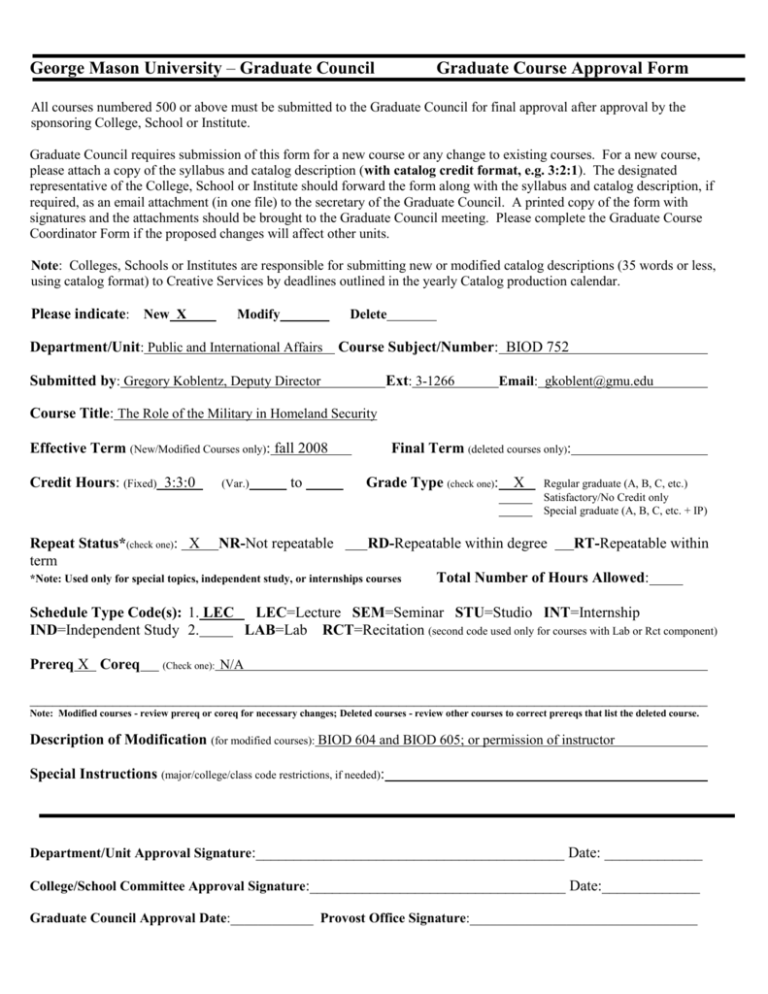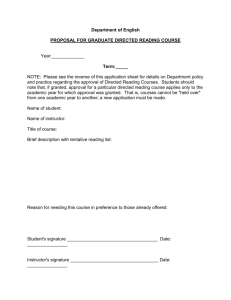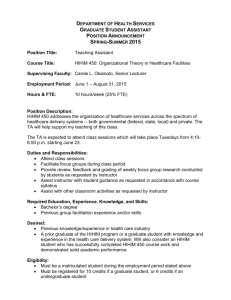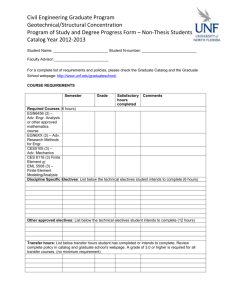College of Humanities and Social Sciences
advertisement

George Mason University – Graduate Council Graduate Course Approval Form All courses numbered 500 or above must be submitted to the Graduate Council for final approval after approval by the sponsoring College, School or Institute. Graduate Council requires submission of this form for a new course or any change to existing courses. For a new course, please attach a copy of the syllabus and catalog description (with catalog credit format, e.g. 3:2:1). The designated representative of the College, School or Institute should forward the form along with the syllabus and catalog description, if required, as an email attachment (in one file) to the secretary of the Graduate Council. A printed copy of the form with signatures and the attachments should be brought to the Graduate Council meeting. Please complete the Graduate Course Coordinator Form if the proposed changes will affect other units. Note: Colleges, Schools or Institutes are responsible for submitting new or modified catalog descriptions (35 words or less, using catalog format) to Creative Services by deadlines outlined in the yearly Catalog production calendar. Please indicate: New X Modify Delete Department/Unit: Public and International Affairs Course Subject/Number: BIOD 752 Submitted by: Gregory Koblentz, Deputy Director Ext: 3-1266 Email: gkoblent@gmu.edu Course Title: The Role of the Military in Homeland Security Effective Term (New/Modified Courses only): fall 2008 Credit Hours: (Fixed) 3:3:0 (Var.) to Repeat Status*(check one): X term NR-Not repeatable Final Term (deleted courses only): Grade Type (check one): X Regular graduate (A, B, C, etc.) Satisfactory/No Credit only Special graduate (A, B, C, etc. + IP) RD-Repeatable within degree *Note: Used only for special topics, independent study, or internships courses RT-Repeatable within Total Number of Hours Allowed: Schedule Type Code(s): 1. LEC LEC=Lecture SEM=Seminar STU=Studio INT=Internship IND=Independent Study 2. LAB=Lab RCT=Recitation (second code used only for courses with Lab or Rct component) Prereq X Coreq (Check one): N/A __________________________________________________________________________________________ Note: Modified courses - review prereq or coreq for necessary changes; Deleted courses - review other courses to correct prereqs that list the deleted course. Description of Modification (for modified courses): BIOD 604 and BIOD 605; or permission of instructor Special Instructions (major/college/class code restrictions, if needed): Department/Unit Approval Signature:_________________________________________ Date: _____________ College/School Committee Approval Signature:__________________________________ Date:_____________ Graduate Council Approval Date:____________ Provost Office Signature:_________________________________ George Mason University Graduate Course Coordination Form Approval from other units: NONE Please list those units outside of your own who may be affected by this new, modified, or deleted course. Each of these units must approve this change prior to its being submitted to the Graduate Council for approval. Unit: Head of Unit’s Signature: Date: Unit: Head of Unit’s Signature: Date: Unit: Head of Unit’s Signature: Date: Unit: Head of Unit’s Signature: Date: Unit: Head of Units Signature: Date: Graduate Council approval: ______________________________________________ Date: ____________ Graduate Council representative: __________________________________________ Date: ____________ Provost Office representative: ____________________________________________ Date: ____________ Dept of Public and International Affairs Biodefense Graduate Programs 4400 University Dr., MS 3F4, Fairfax, VA 22030 Phone: 703-993-9626; Fax: 703-993-1399 To: CHSS Curriculum Committee Cc: Marylou Holly, Academic Coordinator From: Dr. Gregory Koblentz, Director, Biodefense program Email: gkoblent@gmu.edu Date: October 23, 2007 Subject: BIOD 752 New Course Title: The Role of the Military in Homeland Security Justification: This course is currently scheduled to be taught in Spring 2008 as a BIOD 610 special topics course. The course addresses legal and operational issues relating to the role of the military in responding to domestic terrorist events and natural disasters. The issues are relevant to a large percentage of current and future biodefense students, especially in light of the aftermath of Hurricane Katrina. In addition, the course is being cross-listed with the MPA program as PUAD 738 and will be a pre-approved elective for the MPA’s certificate and concentration in emergency management and homeland security. _______________________________________________ Dr. Robert L. Dudley, Chair, Public and International Affairs Dept. George Mason University Department of Public and International Affairs Course Number: BIOD 752 Course Title: Role of the Military in Homeland Security Instructor: Michael Wermuth Catalog Description: Analyzes the role that the armed forces can play in homeland security, including historical and legal developments, the role of the National Guard, capabilities for crisis and consequence management, and case studies of military assistance to civilian authorities in response to riots, terrorist incidents, and natural disasters. Course Overview Even before the end of the Cold War and increasingly in recent years, components of the U.S. military have been in frequent demand for what many view as “non-traditional” military missions: response to natural disasters, counterdrug operations, “nation building.” Following September 11, National Guard units were deployed to “defend” commercial airports around the nation and active units were deployed along national borders. In the aftermath of Hurricane Katrina, the missions, authorities, and capabilities of various military components to perform such missions has once again surfaced as an important topic for debate. We will examine the historical underpinnings of the authorities and restrictions on the use of various components of the armed forces of the United States (active duty and reserve components) as well of the use of the State National Guard in a non-Federal status to perform military missions inside the United States. That examination will include a fundamental understanding of the Constitutional provisions prescribing Federal responsibilities to protect the nation from invasion and, under certain circumstances, to suppress civil insurrections, and of the evolution of significant statutory authorities for the execution of specific missions. Course readings will provide information on the substantial use of the military throughout the history of the Republic for multiple purposes, including the consistent use of military capabilities to provide support to civil authorities under the Robert T. Stafford Disaster Relief and Emergency Assistance Act and related authorities. They will also delve into the continuing debate about the extent to which the military may be use to enforce laws, especially the myths and realities of the so-called Posse Comitatus Act. A focus of the course will be the use of National Guard assets under the command of the governors of the several States, and the tensions that exist between the States and the Federal government on decisions for “calling up” the National Guard into Federal status versus continuing the use of the Guard in its “State” authority. An integral issue that is a thread throughout this examination will be the extent to which such missions could impact U.S. civil rights and civil liberties. Objectives Understand the Constitutional and statutory authorities and restrictions Analyze historical examples Explore alternatives to current missions and authorities Required Readings (All readings will be available through GMU WebCT) Brake, Jeffrey D, Terrorism and the Military’s Role in Domestic Crisis Management: Background and Issues for Congress, Congressional Research Service, Washington, DC, 2001 (CRS) Currier, Donald J., “The Posse Comitatus Act: A harmless relic from the post-reconstruction era or a legal impediment to transformation?,” Strategic Studies Institute, U.S. Army War College, Carlisle, PA, 2003 (Currier) Government Accountability Office, Hurricane Katrina: Better Plans and Exercises Needed to Guide the Military’s Response to Catastrophic Natural Disasters, GAO-06-643, Washington, DC, May 2006 (GAO) Quillen, Chris, “Posse Comitatus and Nuclear Terrorism,” Parameters, U.S. Army War College, Carlisle, PA, Spring 2002 (Quillen) Third Annual Report to the President and the Congress of the Advisory Panel to Assess Domestic Response Capabilities for Terrorism Involving Weapons of Mass Destruction, III. For Ray Downey, Chapter VI., December 15, 2001 (Gilmore 3) The White House, The Federal Response to Hurricane Katrina: Lessons Learned, February 2006 The “Insurrection Act,” 10 US Code, Sections 331-335 The “Posse Comitatus Act,” 10 US Code, Section 1385 10 US Code, Section 382 18 US Code, Section 831 United States House of Representatives, A Failure of Initiative, Final Report of the Select Bipartisan Committee to Investigate the Preparation and Response to Hurricane Katrina, February 2006. United States Senate, Report of the Committee on Homeland Security and Governmental Affairs, A Nation Still Unprepared, May 2006. Robert T. Stafford Disaster Relief and Emergency Assistance Act, PL 100-707, as amended The National Strategy for Homeland Security, October 2007 DoD Strategy for Homeland Defense and Civil Support, 2005 COURSE REQUIREMENTS Readings/projects: Students are required to complete the necessary reading assignments prior to the session as reflected in the schedule and are encouraged to bring resource materials to class. Assignments will be made in class and will not be accepted late. Assignments may be both individual and group work. Attendance: Class attendance is strongly encouraged. Any unexcused absence(s) will be reflected in the reduction of overall grade. University policy will be strictly adhered to regarding absenteeism. Participation: Asking questions and making comments about relevant course material is necessary for effective learning in a seminar. Active and informed participation will be required and will amount to 10% of your grade. Mid-term/Final Exams: Fifty percent of your grade will be determined by tests. These will consist of objective questions to test your knowledge of the readings and essays that will require you to integrate multiple works and theories. Make ups for the mid-term and final exams will be limited to very special circumstances only. Presentations: Ten percent of your grade will be based on student presentations. Students will be required to discuss an actual incident involving the use of the military doemstically and briefly elucidate the problems evident in the response and the implications (or lessons) it has for future incidents. Please do your best to bring out new problems and solutions (e.g. issues that have not been addressed in class but deserve to be included). Research Paper: The remaining portion of your grade (about 30%) will be based on a term paper. Students are required to write a 15-20 page paper which addresses a specific problem of the use of the military domestically in an in-depth manner. This should be a detailed case study of a particular incident involving the military in a domestic setting. Papers are to be typed and double spaced. Examples of recommended citation styles are available in: American Society of Professional Emergency Planners Journal or Public Administration Review. GRADING CRITERIA Grading Students will earn points through attendance, participation, a presentation, the term paper and tests. Please note the following breakdown: Attendance/participation Midterm Presentation Research paper Final Exam TOTAL 10% 25 10 30 25 100 A standard scale will be used for grading (e.g. 90% - 100% = A; 80% - 89% = B; 70% - 79% = C; 60% - 69% = D; 59% and below = F). HONOR CODE ACADEMIC INTEGRTIY George Mason University Academic Policies George Mason University policies are in effect. All your work must be your own, unless the instructor for this course authorizes collaboration, in which case you must, in writing, acknowledge the help you have received. Presenting as one's own the words, ideas, or expression of another in any form is cheating through plagiarism, and will not be tolerated. The claim of ignorance is no excuse. Honor Code: The Honor Code Policy endorsed by members of the Department of Public and International Affairs relative to the types of academic work indicated below is set out in the appropriate paragraphs. 1. Quizzes, tests, and examinations. No help may be given or received by students during the taking of quizzes, tests, or examinations, whatever the type or wherever taken, unless the instructor specifically permits deviation from this standard. 2. Course Requirements. All work, submitted in fulfillment of course requirements, is to be solely the product of the individual(s) whose name(s) appears on it. Except with permission of the instructor, no recourse is to be had to projects, papers, lab reports or any other written work previously prepared by another student, and except with permission of the instructor. No paper or work of another type submitted in partial fulfillment of the requirements of another course may be used a second time to satisfy a requirement in the Department of Public and International Affairs. No assistance is to be obtained from commercial organizations that sell or lease research help or written papers. With respect to all written work as appropriate, proper footnotes and attributions are required. 3. Required Reading. A signed pledge that reading required for a course has been completed may be made a condition of receiving credit in this course. Inability to sign the pledge when required on the final exam will result in the assignment of a grade of "I." COURSE OUTLINE WEEK 1 Introduction to Use of the Military Domestically Gilmore 3 WEEK 2 The Military and Domestic Terrorism Response CRS The Insurrection Act 10 USC 382 18 USC 831 WEEK 3 The Military and Disasters Stafford Act WEEK 4 The Military and Disasters (cont’d) Senate Report WEEK 5 The Military and Disasters (cont’d) House Report WEEK 6 The Military and Disasters (cont’d) White House Report WEEK 7 MIDTERM EXAM WEEK 8 New Structure/New Authority Gilmore 3 WEEK 9Posse Comitatus Currier WEEK 10 Posse Comitatus (cont’d) Quinlen WEEK 10 Posse Comitatus Case Studies WEEK 11 Individual/Group Presentations WEEK 12 National Policy The National Strategy for Homeland Security WEEK 13 DoD Strategy WEEK 14 Course Review FINAL EXAM This syllabus may be modified at the instructor’s discretion as necessary to meet the needs of the course. College of Humanities and Social Sciences COURSE CATALOG COPY FORM For the revision of catalog copy for new or modified courses A. Subject code number, course title, and credit hours. Subject code and number: BIOD 752 Title: The Role of the Military in Homeland Security Credit code: 3:3:0 B. Prerequisites needed prior to registration in the course or co-requisites: Prerequisites: BIOD 604 and BIOD 605; or permission of instructor Co-requisites: N/A C. Description of the course as it will appear in the catalog Analyzes the role that the armed forces play in homeland security, including historical and legal developments, the role of the National Guard, capabilities for crisis and consequence management, and case studies of military assistance to civilian authorities in response to riots, terrorist incidents, and natural disasters. Office of the Dean Use Only Entered By: Date:





